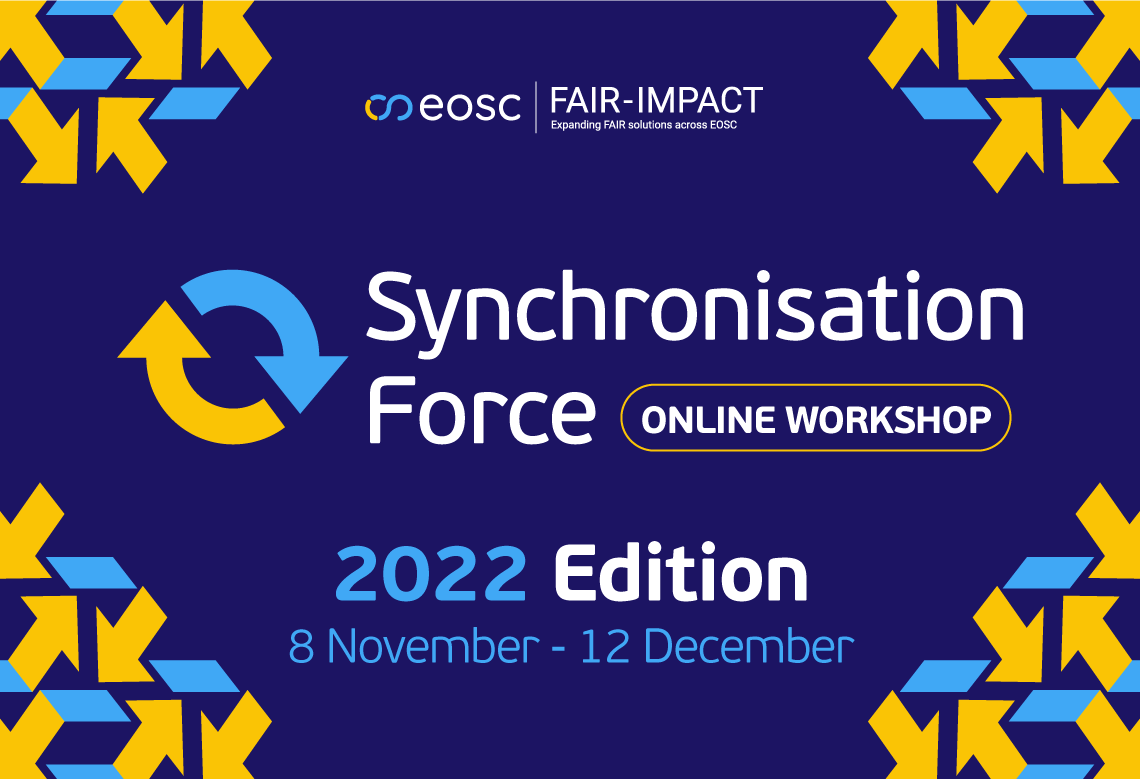Tuesday 8th November, 11.00-12.30 CET: Orientation session
This orientation session gave an introduction to the FAIR-IMPACT project and guided participants through the Synchronisation Force workshop goals, topics, the benchmark recommendations that will guide the discussion and what we expect from participants.
Download the slides | Re-watch the Orientation session |
Session 1: Monday 21st November, 16.00-17.30 CET: Metrics and assessing FAIRness
Chair: Mike Priddy, DANS
Rapporteur: Maaike Verburg, DANS
Context: Agreed sets of metrics should be implemented and monitored to track changes in the FAIRness of data sets or data-related resources over time. In this respect, the development of FAIR Compliant tools and services should meet the needs of data producers and users.
Recommendations assessed during the session:
- Recommendation 1: Provide researchers with metrics and tools to measure the adoption of the FAIR principles for research outputs
Relevant EOSC-A Task Forces
Useful references
Data gathered via the preliminary survey and collaborative spreadsheet| Download Session 1 slides
Session 2: Tuesday 22nd November, 11.00-12.30 CET: PIDs
Chair: Jessica Parland-von Essen, CSC
Rapporteur: Liisa Marjamaa-Mankinen, CSC
Context: The EOSC Persistent Identifier (PID) policy has been written for senior decision makers within potential EOSC service and infrastructure providers and is of interest to all EOSC stakeholders. It defines a set of expectations about what persistent identifiers will be used to support a functioning environment of FAIR research. In this session we will discuss the key concepts of the EOSC PID policy and how PID policies and implementations currently look in different contexts. The session will be an interactive workshop to facilitate discussion and collect data by using concept board and mentimeter.
Expected outcomes. The cross-workshop expected outcome is to assess the status of adoption of FAIR practices with respect to the theme. Based on the data we will present an evaluation of the maturity of PID implementations. This will not be done in a comparative way, but to find the areas that need most focus in developing PID policy work and implementation.
Recommendations assessed during the session:
- Recommendation 1: Implement the EOSC PID policy and architecture, including the development of a global PID resolver
Relevant EOSC-A Task Forces
Useful references
Data gathered via the preliminary survey and collaborative spreadsheet | Download Session 2 slides and concept notes
Session 3: Tuesday 22nd November, 13.00-14.30 CET: Trustworthy and FAIR-enabling repositories
Chair: Maaike Verburg, DANS
Rapporteur: Ryan O’Connor, DCC
Context: According to the Turning FAIR into Reality report, research data should be made available by means of Trusted Digital Repositories to support a specific discipline or interdisciplinary research community. Provide continuous guidance and assistance to repositories to engage with certification processes, most of all small repositories, is therefore strategic.
Recommendations assessed during the session:
- Recommendation 1: Measure the percentage of the repositories in EOSC that will have a certification such as CoreTrustSeal
- Recommendation 2: Provide continuous guidance and assistance to small repositories to engage with certification processes
Relevant EOSC-A Task Forces
Useful references
Data gathered via the preliminary survey and collaborative spreadsheet | Download session 3 slides
Session 4: Thursday 24th November, 14.00-15.30 Metadata, semantics and interoperability
Chair: Clément Jonquet, INRAE
Rapporteur: Oscar Corcho, UPM
Context: FAIR-IMPACT’s WP4 focuses on several aspects of the lifecycle of FAIR semantics artefacts – a broader term to include ontologies, terminologies, taxonomies, thesauri, vocabularies, metadata schemas and standards – such as governance, creation, sharing, reuse, FAIRness assessment. FAIR-IMPACT’s T6.1 focuses on semantic interoperability for EOSC and how semantic artefacts help to support it. In the context of the 1st FAIR-IMPACT Synchronisation Force workshop we launch this session to gather different communities to make an inventory of the state of use of semantics artefacts in their scientific domain. We will survey multiple scientific communities directly involved within FAIR-IMPACT and beyond: agri-food, biodiversity/ecology, biomedicine, photons&neutrons, astronomy, materials, industry, earth sciences, social sciences & humanities. Which metadata standards and ontologies are used? Is there a reference semantic artefact catalogue in this area? Is there a governance for semantic artefacts? etc. The session will feature short summary presentations of experts in each area and discussion for path of improvement, cross-community fertilisation.
Recommendations assessed during the session:
- Recommendation 1: Develop domain and cross-domain interoperability frameworks at the level of vocabularies, ontologies, and metadata schema
- Recommendation 2: Further develop and implement semantic technologies, particularly in domains where their use is less advanced
Relevant EOSC-A Task Forces
Useful references
Data gathered via the preliminary survey and collaborative spreadsheet | Download session 4 slides
Monday 12th December, 13.00-14.30: Concluding session
This plenary session presented the participants with the draft findings and conclusions from the topic sessions. Useful for those who did not participate in some sessions to help safeguarding commitment with what the Synchronisation Force is concluding and publishing.
Download the slides from the concluding session
